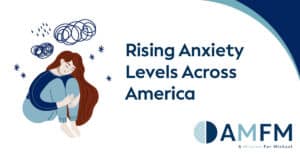Did you know that major depressive disorder is the leading cause of disability for Americans between the ages of 15 and 44? And, did you know that major depressive disorder affects 6.7 million American adults- or 16.7 percent of the population- in any given year?
While these statistics may be alarming, the good news is that there are many treatment options available for those who suffer from depression.
But, you can only take advantage of these treatment options if you know that you have depression in the first place.
The truth is, contrary to popular belief, not everyone who suffers from depression feels sad all the time and like they can’t get out of bed. Some people suffer from something called “high functioning depression,” a variation of depression in which the signs and symptoms can be much more subtle – but still very much present.
But, how can you tell if you or a loved one has high functioning depression? Check out this guide to learn about the top signs of high functioning depression.
What is High Functioning Depression?
First things first: what is high functioning depression, exactly?
If you suffer from high functioning depression, you’re typically a productive citizen to the outside world. Some might even say that you’re highly successful. However, at the end of the workday, you usually feel like you’ve spent the majority of your internal resources. At this point, maybe the best you can do is plop into bed so that you’re ready for tomorrow.
While high-functioning depression isn’t a technical medical diagnosis, it’s a useful term that many medical professionals and others use to describe someone with high levels of depression who appears to be functioning normally in society.
Typically, high-functioning types don’t suffer from a major depressive disorder, but rather, low-grade depression, which is mostly marked by lagging energy and fatigue.
If you suffer from high functioning depression, it’s often challenging for others to tell, as you’re usually capable of slapping on a brave face and going about your business.
Frequently, people who suffer from high functioning depression don’t even realize they have a problem until one day they see they’re sick of feeling blue all the time and their emotions start to boil over.
There are also sure signs and symptoms you can watch out for, which we’ll get into now:
1. Declining Social Invitations
Sure, we all have nights where we’re spent, and going to a party is the last thing on earth we want to do.
But, if your enthusiasm to partake in social activities is continually dampened, then you may be suffering from high-functioning depression.
If you find that interacting during the workday leaves you absolutely spent, and that you’re often making excuses to get out of social events, such as “work has been really stressful”, then this may be a sign of high-functioning depression.
It’s also important to note that while this type of behavior may not seem catastrophic, it can be incredibly dangerous. This is because most people with depression find that the more they isolate themselves from the outside world, the worse their symptoms become.
2. You Suffer From Other Health Issues
Depression often goes hand in hand with other health issues, both mental and physical.
This is because other medical conditions, such as cancer and diabetes, can cause stress and strain which can then lead to depression.
And, on the other hand, depression can lower immunity, which can then make you more vulnerable to becoming ill.
3. Sleep Problems
Those who suffer from depression at any level often suffer from sleep problems.
Sleep problems can mean anything from having trouble falling asleep at night, not being able to stay asleep, sleeping too much, or sleeping too little.
Sleep issues can make your depression dramatically worse, as good sleep is key to good mental health. One study found that those who have insomnia are ten times more likely to suffer from depression and 17 times more likely to suffer from anxiety.
So, if you have incredibly disruptive sleep patterns, it may be time to talk to your doctor.
4. You Feel Like You’re Constantly “Faking It”
Many people with high functioning depression also suffer from imposter syndrome. The feeling of inadequacy characterizes imposter syndrome, despite clear evidence of success.
Often, those with imposter syndrome feel like they “don’t deserve” their success or that their success “isn’t real”.
If you feel like you’ve become good at “playing yourself” and that you’re acting like a successful person but aren’t one, then you may be suffering from high-functioning depression.
This symptom can be particularly dangerous, as it can lead to a slippery slope of low self-esteem problems and sometimes even suicidal thoughts.
5. You’re Often Anxious and Worried
Many people make the mistake of solely equating depression with the emotion of sadness. After all, this is often what we see in commercials for depression- the image of a sad person gazing out the window.
Yet, it’s essential to know that there’s another strong emotion that’s also linked to depression- anxiety.
That’s right. While some people’s depression manifests as sadness, other people’s depression manifests as worry. So, if you often experience mental confusion, persistent fear, or the feeling of having a pit in your stomach, then you may be suffering from high functioning depression.
6. You Self-Medicate
Just because people with high functioning depression can succeed in the outside world, doesn’t mean they wouldn’t benefit from medication or other forms of treatment.
Yet, many people with high functioning depression don’t know this, which is why they turn to dangerous forms of self-medication, such as drinking, doing drugs, or overeating.
What’s Next?
If any of these signs of high functioning depression sound familiar to you, then it’s time to schedule an appointment with your doctor.
Remember, even though you may be doing just fine in your life, your depression may eventually start to eat away at you. If you don’t seek treatment, your symptoms will only get worse.
In some cases, it can be beneficial to enter a treatment program for your high functioning depression. If you’re interested in a treatment program, check out this guide to learn about the one we offer in San Juan Capistrano, CA.








